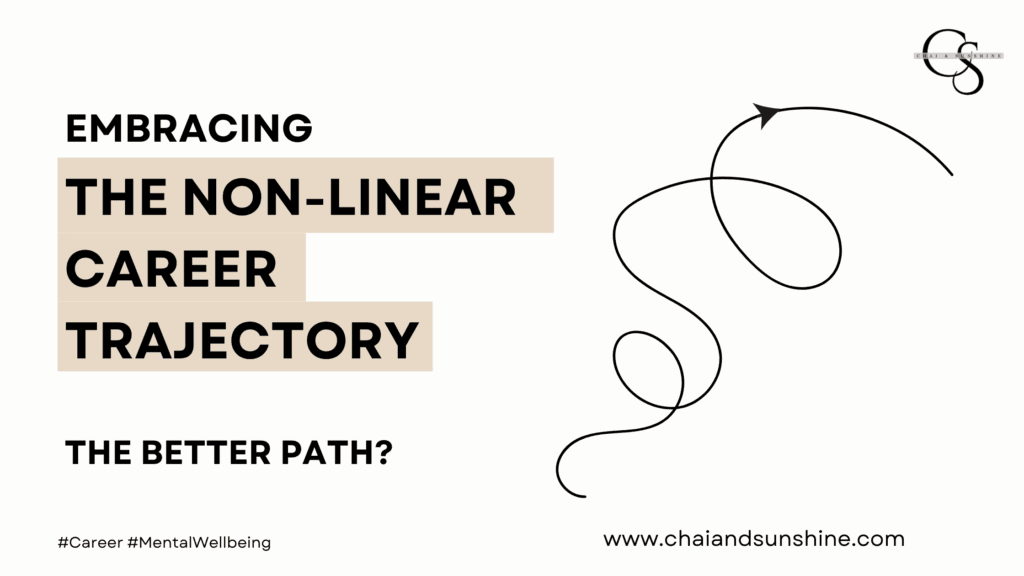Why a Non-Linear Career Trajectory is NOT a Bad Thing

When I was in high school, I was expected to pick a career path, study for it, and then—presumably—stick with it for the rest of my life. The idea was simple: choose wisely, because this decision would determine my future.
But life doesn’t work like that.
Like many people today, my career trajectory has been anything but linear. I’ve studied engineering, business, and complex systems. I’ve worked in different countries, shifted industries, changed work styles, and even taken pay cuts in pursuit of something different or more meaningful.
At times, this has been incredibly frustrating—especially because of the pressure I put on myself to hit certain milestones. But the more I tried to force a rigid path, the more I realised: this mindset is toxic.
The idea that life is a straight-line race, where success is measured by how quickly you move up a single ladder, is outdated.
In reality, careers are dynamic, and the most fulfilling ones embrace exploration rather than a rigid trajectory.
If you’ve ever felt like you’re “falling behind” because your career hasn’t followed a predictable path, this article is for you.
Table of Contents
ToggleThe Traditional Career Model is Breaking Down
For decades, the standard career model followed a simple formula:
- Choose a career in high school.
- Study for it.
- Get an entry-level job.
- Climb the corporate ladder.
- Retire.
That model no longer reflects reality
Here’s why:
- Technological advancements have rapidly changed industries, making many jobs obsolete while creating entirely new fields.
- The gig economy has normalised freelance, contract, and multi-career work.
- Economic shifts have made long-term employment with a single company far less common.
- Changing values have led people to prioritise fulfillment and flexibility over traditional notions of job security.
- Job hopping is the norm, often leading to better pay and learning.
I also really like what Emilie Wapnick, author of How to Be Everything, calls multipotentialites—people with multiple interests and career paths.
She argues that forcing people to specialise in one thing for life ignores how many of us are wired to thrive in multiple disciplines.
For those of us who have changed careers (or want to), this is good news.

Why the Non-Linear Career Trajectory is the New Normal
1. Lifelong Learning is the New Job Security
The idea that a single degree will carry you through an entire career is outdated. In today’s world, adaptability is more valuable than rigid specialisation.
2. Multi-Career Professionals are Thriving
Take it from these guys:
- Brandon Stanton, creator of Humans of New York, worked in finance before losing his job and deciding to pursue photography and storytelling.
- Lisa Congdon was in her late 30s when she transitioned from working in education to becoming a professional artist and illustrator.
- Bozoma Saint John, a high-profile marketing executive, started in healthcare marketing before moving into the music and entertainment industry, later holding executive roles at Apple, Uber, and Netflix.
3. Remote and Flexible Work Have Changed the Game
The traditional 9-to-5, office-based career is no longer the only option. More people are working remotely, freelancing, or creating portfolio careers that combine multiple income streams. We’re no longer tied to geography.
4. We Are Not the Same People at 40 as We Were at 18
At least, I hope not!
Expecting an 18-year-old to choose a lifelong career is unfair. We grow, change, and develop new interests. Isn’t it normal that our careers evolve too?
I think we’re waking up to that realisation as a collective.
My Non-Linear Career Trajectory: From Engineering to Existential Risk
For most of my life, I believed success meant following a straight path. I started in civil engineering, where I excelled academically (though I had little interest in it. A story for another time). I went into complex systems engineering, industrial waste management, business, and more.
Now, I’m focusing on research into existential risks like AI and biotechnology. An interest I hope to monetise after the completion of my studies. A non-linear career trajectory, to say the least!
But these shifts came with challenges:
- A self-imposed pressure to “succeed” quickly. I constantly worried that I was “falling behind.”
- Financial trade-offs. Some transitions meant taking a pay cut or starting over in a new field.
- The fear of looking unreliable. Would employers see my shifts as a lack of commitment?
I can’t speak to any of these points with “hindsight” because I still have days when I feel scared, pressured, or regretful.
What I can say is that the mindset that life is a race—where success is measured by speed and linearity—is deeply toxic.
I know in my heart that exploration, not rigidity, leads to a more fulfilling life.
But there are times when changing careers is not necessarily the right thing –

When a Non-Linear Career Can Be Difficult (or Even a Bad Thing)
While non-linear careers offer freedom and growth, they also come with challenges. Here are a few:
1. Financial Instability
Frequent career shifts without financial planning can be risky.
Solution: Build a financial cushion before making major changes.
2. Lack of Direction
Not everyone thrives with multiple career pivots.
Solution: Have a guiding purpose, even if it’s broad (e.g., problem-solving, creativity, social impact) can help you build a more coherent portfolio of work.
3. Social Stigma
Some people (especially older generations) see frequent career changes as flaky.
Solution: Learn to frame your career shifts as a strength—highlight your adaptability and transferable skills.
4. Imposter Syndrome
Switching fields can make you feel like you’re always a beginner.
Solution: Recognise that expertise builds over time. Being a generalist is an asset in today’s world.
5. Workplace Biases
Some industries still favour linear resumes.
Solution: Tailor your resume and narrative to emphasise how your diverse experience adds value.
How to Stay Grounded When Your Career Feels Like It’s Falling Apart
It’s one thing to embrace a non-linear career path when things are exciting and full of possibility. But what about when your career seems to be going backward instead of forward? Maybe you’ve taken a pay cut, lost a job, or find yourself starting over (again).
In those moments, it’s easy to panic and wonder: Did I make a mistake? Am I ruining my future?
Here’s how to stay grounded and regain your sense of direction when your career feels like it’s on a downward slide:
1. Separate Your Worth from Your Job Title
One of the most damaging beliefs we internalise is that our career success defines our value as a person. But you are not your job title. Losing a position, taking a step back, or making less money for a time does not mean you are failing at life. It means you’re in transition.
Ask yourself: If I stripped away all titles and external markers of success, who am I? What do I really care about?
Reconnecting with your deeper identity can make career setbacks feel less like a personal failure and more like a redirection. And having the confidence to go on can make all the difference.
2. Zoom Out: Look at Your Career Like a Stock Chart
If you look at the stock market on any given day, you’ll see peaks and valleys. Some days, it crashes. But if you zoom out over decades, you see steady growth.
Careers work the same way.
Your current downturn is just one moment in a much larger picture.
Ask yourself: Five years from now, will this setback define my entire career? Or will it be one pivot point in a bigger story of growth?
3. Focus on Skills, Not Status
When people feel stuck or like they’re backtracking, it’s often because they measure success by external milestones—title, salary, prestige. But a more resilient approach is to focus on what you’re learning, not where you are on the “ladder.”
Instead of asking, Am I climbing fast enough? ask:
✅ What skills am I gaining right now?
✅ How can I leverage this experience in the future?
✅ What strengths am I building that will serve me later?
Even during a rough career phase, you are still accumulating skills, knowledge, and resilience. That’s what will set you up for the next opportunity.
4. Find Career Expanders (Not Just Mentors)
Most career advice tells you to find a mentor—a senior figure who guides you. But when you’re in a career slump, what you really need are career expanders—people who have walked unconventional paths and proved that success doesn’t always look linear.
Seek out stories of people who have pivoted, failed, restarted, and ultimately thrived. It normalises the bumps in the road and reminds you that careers are messy for everyone, not just you.
5. Keep Moving, Even If You Don't Have the Perfect Plan
When you’re feeling lost, the worst thing you can do is freeze in fear. (Trust me, I know!). Progress doesn’t come from knowing the perfect next step—it comes from taking any step forward.
- Take a course in something that excites you.
- Start a side project, even if it’s small.
- Reach out to someone whose career path inspires you.
- Apply for something, even if you don’t feel “ready.”
Momentum creates clarity. You don’t have to see the whole road ahead—just take the next step.
The Non-Linear Career Trajectory for Highly Sensitive People (HSPs)
I had to do a special mention of my fellow Highly Sensitive People (HSPs). We often struggle with rigid, high-stress work environments. So, non-linear careers can actually be beneficial for HSPs in several ways:
1. More Freedom to Align Work With Wellbeing
HSPs thrive in work environments that prioritise emotional balance. A non-linear path allows more freedom to leave toxic workplaces.
2. Greater Opportunity for Meaningful Work
HSPs need careers that align with their values (which, in themselves, might change). Non-linear careers allow for exploration in search of purpose.
3. Ability to Shift Away from Overwhelming Roles
High-stress jobs can drain HSPs. Non-linear paths make it easier to transition to roles that are more sustainable.
4. Monetising Multiple Skills for Stability
Remember when I mentioned multipotentialites? Well, many HSPs often have deep skills in multiple areas (e.g. writing, coaching, design, research). A non-linear career allows for multiple income streams.
How HSPs Can Navigate Career Changes:
- Listen to your energy levels. Some jobs may be too intense long-term.
- Create a resilience strategy. Career shifts can be emotionally draining.
- Find mentors (or, better yet, career expanders!) who understand non-traditional paths.
Embracing a Career as an Evolving Journey
The idea that careers should be static and linear is outdated. We should embrace careers as evolving journeys, shaped by growth, curiosity, and changing priorities.
What if we stopped seeing career changes as “mistakes” and instead viewed them as part of a rich, fulfilling life?
Key Takeaways:
✅ Non-linear careers are increasingly common and even advantageous.
✅ Changing careers is not a failure—it’s a sign of adaptability.
✅ Multipotentialites thrive by embracing diverse skills and experiences.
✅ HSPs may benefit from non-linear careers that prioritise well-being.
✅ Career fulfilment comes from alignment, not a rigid trajectory.
Final Thoughts
We need to stop treating careers as a race. Life is not about hitting milestones at the fastest pace—it’s about designing a path that fulfills and sustains you.
As Emilie Wapnick says in How to Be Everything:
“You don’t have to choose one thing. You can be everything.”
So, if you’ve been doubting your career shifts, take a deep breath. You’re not lost. You’re exploring.
What’s one step you can take today to embrace your evolving career journey?
